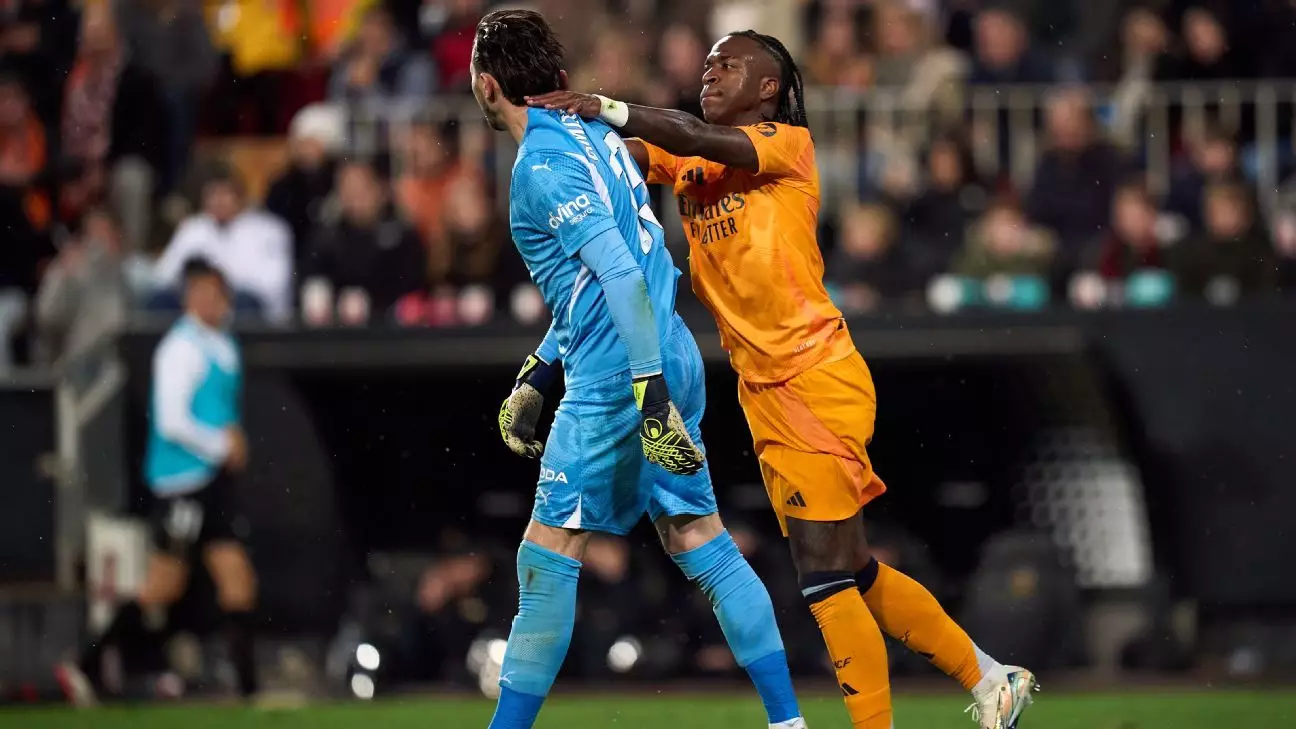The recent two-match ban imposed on Real Madrid’s forward Vinícius Júnior has sparked widespread discussions about fairness and player treatment in football. The young Brazilian was sent off during a tense incident against Valencia, where his frustration led to a strike on goalkeeper Stole Dimitrievski. Despite the red card, Real Madrid showcased resilience, turning the match around to secure a 2-1 victory. However, the disciplinary committee’s decision to suspend Vinícius for two matches, considering it not to be “an aggression,” highlights a significant gap in how certain actions are perceived and penalized on the field.
In the aftermath of the suspension, Carlo Ancelotti’s defense of Vinícius Júnior has been notable. The manager articulated a strong rebuttal against the notion that Vinícius provocatively challenges opponents. Ancelotti emphasized the importance of acknowledging the racial abuse and verbal insults that Vinícius has endured on the pitch, suggesting that these external pressures have heavily influenced his gameplay. By shifting the narrative back to the context of abuse rather than focusing solely on the player’s reactions, Ancelotti asserts that Vinícius is a victim of a toxic atmosphere rather than an instigator of conflict.
Vinícius Júnior’s recent accolade as FIFA’s The Best Men’s Player, along with his second-place finish for the Ballon d’Or, encapsulates a remarkable rise in his professional career. He contributed significantly to Real Madrid’s success in not only the LaLiga but also the Champions League last season. Despite his achievements, the challenges he faces, particularly confrontations with opponents and the psychological strain stemming from racist abuse, cannot be ignored. His disciplinary record, which includes only two red cards both incurred against Valencia, further illustrates that instances of misconduct are often magnified, overshadowing his overall contributions on the field.
The situation surrounding Vinícius Júnior raises critical questions about player safety and the mechanisms by which incidents of racial abuse are managed in football. The fact that Vinícius faces discipline not only for on-field actions but also as a reaction to the abuse he receives can set concerning precedents in player conduct regulations. Ancelotti’s comments serve as a reminder of the importance of the football community coming together to redefine acceptable behavior and champion the rights of players to compete without fear of abuse.
As Real Madrid prepares for the Spanish Supercopa semi-final against Mallorca, Vinícius’ absence will undoubtedly be felt on the pitch. His unique skill set and ability to change game dynamics are irreplaceable. Meanwhile, speculation around potential signings, including Trent Alexander-Arnold, reflects the ongoing evolution of the team as they navigate the complexities of player roles and adaptability. Lucas Vázquez, currently filling in at right-back, echoed the sentiment that the focus should remain on the task at hand rather than speculation.
Ancelotti’s backing of Vinícius Júnior underscores the vital intersection of talent, mental health, and systemic issues in sports. It invites a thorough reevaluation of how disciplinary actions are imposed, particularly in cases where underlying social issues complicate player behavior and reactions.

Leave a Reply